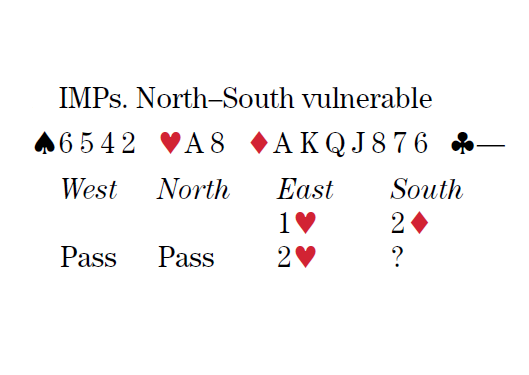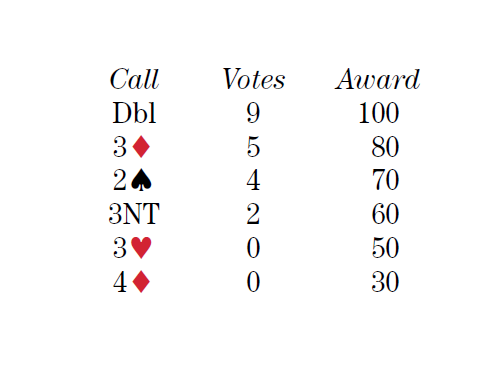
What’s your call?
| 2♠ | 2NT | |||
| 3♣ | 3♦ | 3♥ | 3♠ | 3NT |
| 4♣ | 4♦ | 4♥ | 4♠ | 4NT |
| 5♣ | 5♦ | 5♥ | 5♠ | 5NT |
| 6♣ | 6♦ | 6♥ | 6♠ | 6NT |
| 7♣ | 7♦ | 7♥ | 7♠ | 7NT |
| Dbl | Pass |
What spade suit?
Having overcalled diamonds on their first go-round, the doublers hope now to invite partner (and his spades) into the proceedings.
The Gordons double, planning “to take a shot at 3NT over 3♣, raise spades to game and pass 3♦.”
“Hard to get to 3NT with any certainty,” says Lawrence, who doubles, “but getting to spades should be possible now.”
Cohen says he would have doubled the first time rather than bidding 2♦. “I only want to play in spades if partner bids them. I fear that if I bid them, he will pass with 3–1 in spades/
diamonds. I have no fear of clubs. I can always correct to diamonds.”
The Sutherlins see their takeout double as the best way to get spades into the picture. “If partner bids spades, we can raise to game. If partner bids clubs, we will take a shot at 3NT.”
Robinson doubles, too, to find out if partner has spades. “I can convert clubs to diamonds.”
“This may be the last chance to suggest spades,” says Boehm. “Meanwhile, let’s see some more bidding before deciding anything rash.”
Rigal calls jumping to 3NT “tempting,” but settles for double. “Finding that ninth winner may be easier said than done. My plan is to bid a third time and hope for the best, but not expecting it.”
Falk doubles. “At first I thought of 2NT, planning to correct 3♣ to 3♦ and so showing secondary spades. But partner, not being in on the joke, might go soaring in clubs. There are a lot of points and a lot of clubs unaccounted for!”
“Repeating our diamonds seems about right for offensive potential,” reason the Joyces. “We are wary of a 4–4 spade fit when both of us may have poor spades.”
“Going low with 3♦ ‘cause nothing else appeals,” shrugs Colchamiro.
Walker, who says she might have made a more aggressive bid — such as double or 3NT — at her first turn, is retiring to a more conservative position now. “3♦. The silence from West and North is somewhat ominous.”
Stack allows, “Partner may have four spades, so doubling to get spades into the auction is a possibility. The override is that the diamonds are so good and the spades are so bad. We had better focus on the great suit. If the opponents compete over 3♦, we may bid 3NT and will not be surprised if partner contributes a trick and we make it.”
Then there are the experts who view ♠6 5 4 2 as a biddable suit … at the two level … vulnerable … and yes! they bid 2♠. Maybe that’s why they’re the experts.
Here’s Weinstein’s rationale: “Because neither opponent doubled 2♦, partner is a favorite to have three-plus spades. We have only eight top tricks in 3NT and they may have running clubs, while spades is often better if we have an eight-card fit or more. Finding the right game is more important than occasionally rotting in 2♠.”
Says Hampson, “Although they are anemic, I do have four spades and our most likely game is in 4♠ as opposed to 3NT or 5♦.”
Guest panelists Isfeld and Henneberger go with 2♠. “A 3NT gamble now could work out well, but why guess? Partner could easily have spades without values to advance over 2♦. We can always get to notrump later over spades, but we can’t get to spades over notrump.”
Sanborn: “We can still have a game in either spades or notrump even though partner has passed. It is a bit scary to think of playing here facing a three-card holding.” (Aha! Even the experts do get scared.) “One would
like to bid 2NT natural, but that should be takeout for minors with better diamonds. Come to think of it, I do have better diamonds.”
The intrepid 3NT bidders are not in the least bit interested in going low.
“Why did we not either double or, better yet, bid 3NT the last time?” demand the Coopers.
“This is piggy, but I am bidding 3NT,” says Meyers, hoping for the best. “If they run a black suit, so be it. No one has bid clubs, so I imagine partner has that suit stopped.”

